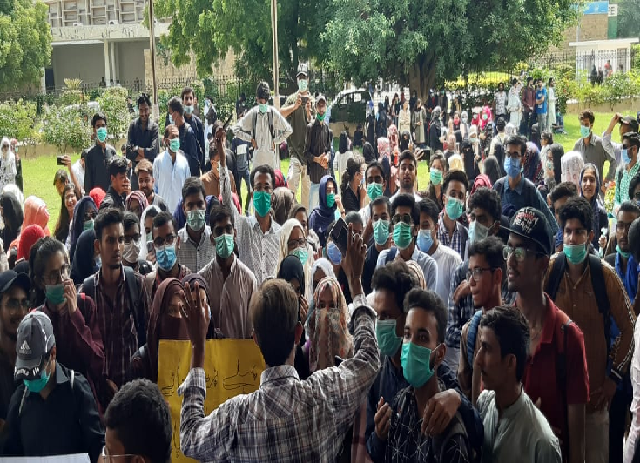
Universities across the province have reopened but there are no signs of an ease in tensions between the institutions and their students.
Last week, cities across Punjab witnessed students protesting against their universities’ initial decision to conduct on-campus exams.
The students rejected the unilateral decision of physical exams.
In a short span of a few days, the students staged protests in almost all the major cities, including Lahore, Faisalabad, Multan, Dera Ghazi Khan, Islamabad, Peshawar and Karachi.
Social media platforms were also abuzz with various hashtags including #studentsrejectoncampusexams. This hashtag remained a top trend on Twitter for over a week.
At many universities, they remained successful in coercing the administration to issue notifications withdrawing the decision of on-campus examination. These included UMT Lahore, Ghazi University in DG Khan, Emerson College Multan as well as some universities in Islamabad.
However, the protesting students faced use of force, intimidation and rustications in several institutions for raising their voice in an attempt to reverse the administrations’ decision to conduct on-campus exams.
After students across the province raised their voice, there was a respite in protests as some universities decided to hold online exams. However, others did not change their decision of on-campus exams.
As many as 19 students of University of Central Punjab were suspended and five were arrested over the protests.
The protests continued in Karachi, Islamabad, Lahore and other parts of the country despite registration of cases against leading student activists, arrests and the use of force against them.
Reportedly, no traditional student organisation started or led the protests. This countrywide series of protests emerged spontaneously.
A group of students on a social media platform reportedly started online criticism against the universities issuing schedules of on-campus examinations after the government ordered the reopening of the institutions from February.
In a short span of time, it gained the attention of a large number of students across Pakistan.
Some of the students decided to give a call for protests in Islamabad and the turnout was unexpectedly high. They blocked highways and faced the administrations’ high-handedness. Thus the online protests and criticism led to demonstrations outside campuses across Pakistan. After Islamabad, the students staged protests in other major cities.
The recent issue may seem trivial, but there were underlying problems. The students’ outcry is just the tip of the iceberg of their grievances that had been piling up for three decades.
Students unions were banned in 1984.
The woes of the students remained after they were deprived of their democratic rights. They have been facing fee hikes, privatisation of the education sector and lack of proper hostels, buses, canteens and other basic facilities.
Other issues include on-campus harassment, poor quality of education and unemployment.
When all this had been going on, the decisions were imposed unilaterally by the government and the higher educational institutes. What was good and bad for students was decided without taking their input.
The students’ wellbeing simply did not matter. This mindset prevailed during the current wave of student’s protests as evident by the government and Higher Education Commission’s (HEC) tardy and confused response to their demand.
The HEC and federal education minister, rather than chalking out a clearly demarcated, unanimous policy for exams left the matter to be decided by the universities themselves.
This may exacerbate the crisis as certain universities proceed with on-campus exams. A large number of universities had not made preparations to conduct online exams.
Published in The Express Tribune, February 7th, 2021.

1719660634-1/BeFunky-collage-nicole-(1)1719660634-1-405x300.webp)

1732276540-0/kim-(10)1732276540-0-165x106.webp)

1732274008-0/Ariana-Grande-and-Kristin-Chenoweth-(1)1732274008-0-165x106.webp)
1726722687-0/Express-Tribune-Web-(9)1726722687-0-270x192.webp)











COMMENTS
Comments are moderated and generally will be posted if they are on-topic and not abusive.
For more information, please see our Comments FAQ